- Home
- Keigo Higashino
A Midsummer's Equation: A Detective Galileo Mystery Page 21
A Midsummer's Equation: A Detective Galileo Mystery Read online
Page 21
A wrinkle formed between Reiko’s eyebrows as she thought. Kusanagi knew it was a long shot. She might have forgotten in the last fifteen or so years, if she even knew in the first place.
He was on the verge of telling her it was okay and leaving, when Reiko looked up. “Well—”
“You remember where she lived?”
“I went to her house a few times. I know it wasn’t in Oji.”
“Where was it?”
“I don’t remember the place exactly. Except, I remember the station we got off at.”
“Which was?”
“Ogikubo.”
Ogikubo, where Nobuko Miyake was murdered. Kusanagi’s heart thudded in his chest. He made an effort not to let it show on his face. “Ogikubo, right. Do you remember anything more? For example, what direction you walked from the station?”
Reiko frowned and shook her head. “It was a bit of a hike. Narumi used her bike to get to the station from home, I remember that,” she said, not sounding particularly confident.
“Did she live in a house or an apartment?”
“A small house, I think.”
“Do you think you could show me on a map?”
“Sure, one moment.” Reiko stood.
Kusanagi watched her walk off and drank some of his tea. He loosened his necktie and tried to cool off a little.
Reiko returned a few moments later, carrying a laptop computer. “It’ll be quicker if we check on this,” she said, going online and pulling up a map of the area around Ogikubo Station.
“Do you have any idea where the house might have been?” Kusanagi asked.
Reiko started the screen for a while, but then shook her head. “I’m sorry. I don’t think so. I was always following Narumi, so I never really paid attention to the route.”
That was unsurprising. At least Kusanagi wasn’t leaving empty-handed.
“I was thinking,” Reiko said. “You could ask Narumi yourself. I have her number. At least, that is, if she hasn’t moved.”
“Oh, no, that’s fine.” Kusanagi shook his head. “We’re just starting by talking to people here in Tokyo. I’ll be speaking with Ms. Kawahata at some point, and I do have her number. She’s currently in Hari Cove, I believe.”
“That’s right. Her father’s from there originally, right? That’s where they went after Tokyo.”
Kusanagi nodded. “Actually, I wanted to ask, do you remember if the move was a sudden decision, by any chance? Had they known about it for some time before?”
“Well, for us, it did seem pretty sudden. I mean, Narumi thought she’d be going to high school with us. And we knew about the family business, but she said she wouldn’t go, even if they left—even if it meant staying in Tokyo all by herself. That’s why we were all so surprised when she just up and left for Hari Cove.”
“Did you talk to her about that on the phone?”
“No, not really. I think there must’ve been something going on, you know, something personal.” Reiko’s eyes narrowed as she looked at the detective. “You said this didn’t have anything to do with Narumi, right? Does her moving have something to do with your case?”
“No, not particularly.”
“Well then, I have no idea what you’re after. Could you at least tell me what kind of case it is? This is really going to bug me.”
“I’m really sorry,” Kusanagi said, bowing his head, “but it’s against the rules.” He stood from the table. “Thank you again for your time and for your help.”
“Was it? A help, I mean.”
“Absolutely.” Kusanagi began to walk toward the door, but stopped halfway and turned around. “Actually, there’s one more thing I’d like to ask you. A favor. I am going to go talk to Ms. Kawahata, eventually, but if you could, please don’t mention this to anyone. Word travels fast, and there’s a chance she might hear about it before I get a chance to sit down with her.”
Reiko nodded, then a mischievous smile came to her face. “I can tell my mom, right? She knows I’m meeting with you, after all.”
“I’d prefer it if you didn’t, honestly.”
“What? You know she’s going to give me a thorough questioning when I get home.”
“Well, you’ll just have to think of something to tell her,” Kusanagi said.
“Something to tell her. Right.” Reiko frowned.
He walked out through the sliding doors onto the street. He was pondering his next move, when a voice from behind called out, “Detective?”
He turned to see Reiko running over to him. “I just remembered something. I went over to her house once in early April. There was a park really nearby, and we all went there to see the cherry trees.”
“A park with cherry trees? Are you sure?”
“Yes—that was the only time we went cherry blossom–viewing in middle school, so I remember it really well.”
Kusanagi give it some thought, then nodded and smiled at her. “Thank you, that’s very—”
“Helpful, I know. You’re sure I can’t talk about it?”
Kusanagi shook his head. “Sorry, no.”
“Right,” she said. She wished him good luck with the investigation, then went back to the showroom. Kusanagi watched her leave, then set off again, taking big strides in his excitement.
Both Ogikubo and a park featured prominently in the crime scene details surrounding Nobuko Miyake’s death. It was looking more and more like the Kawahatas were involved with the Senba case after all.
He was just thinking he should call Yukawa and tell him, when his phone began to buzz. He checked the display. It was Utsumi. She had gone to talk to Tsukahara’s widow to see if she might know where he would’ve taken a homeless man to receive medical care.
“You get anything?” he asked, picking up.
“I can’t say for sure, but what I did hear is very intriguing.”
“The widow told you something?”
“No, not from her, it was from the prefectural detectives.”
“What, you ran into them?”
“They were at the house when I got there. Two guys, both in homicide. They let me observe.”
“What were they there for?”
“They wanted to know if Tsukahara had any connections out in Chofu.”
“Chofu? This is the first time I’ve heard anything about Chofu.”
“Yeah, me too. Apparently he mailed something from the post office by the station.” She explained the attendance voucher and the hearing in Hari Cove.
“What did the widow say?”
“She gave it some thought, but in the end, she said she didn’t know. She thought he might’ve gone there while he was still on duty, but he never talked about work at home.”
He pictured Sanae Tsukahara’s face, that look of determination in her eyes. If she had never asked her husband about his work, it wasn’t due to a lack of interest. It was because she knew there were things she was better off not knowing, just as there were things he was better off not having to share.
“The prefectural guys want to know anything else?”
“Nothing new. They asked again whether she’d thought of any connection to Hari Cove, things like that. Of course she had nothing for them.”
“Did they ask you anything?”
“They wanted to know why I had come to visit the widow.”
“You tell them about the hospital?”
“Should I have?”
Kusanagi grinned. “What’d you say?”
“I told them I came to borrow family albums—that I was looking for a photo that might show Tsukahara in Hari Cove.”
“Did they buy that?”
“It took the wind out of their sails a little. They knew that the Tokyo Police Department was involved, but I don’t think they were very impressed with that particular line of inquiry. Nor with the fact that Tokyo had put a single detective on the case—young and female, at that. Incidentally, there weren’t any photo albums in the house. Someone from the prefectural police to
ok them all the last time they visited.”
Utsumi spoke very matter-of-factly, and Kusanagi had to strain to detect the slight hint of irritation in her voice.
“Don’t let it get to you,” he said. “Besides, you got something out of it.”
“It didn’t get to me. And I’m glad you think the trip was useful.”
“Of course it was. If Tsukahara mailed his application from Chofu, it probably means he was out there meeting someone with a deep connection to Hari Cove.”
“I agree, and I’m already on it. Sorry to tell you after the fact.”
Kusanagi steadied his grip on his phone. “You’re going to Chofu?”
“I went back home and got my car—the plan is to check in with every hospital in the area.”
“Good call. Shizuoka prefectural police will start asking questions around there sooner or later, but you’ve got a leg up on them with the hospital lead. Make it count.”
“Will do. How are things on your end?”
“Well…” He licked his lips. “I’ve got a few leads. I’ll tell you about them when you’re done. I don’t want to distract you while you’re on the beat.”
“Now you’re getting my hopes up.”
“As they should be. Later,” he said, and hung up. Normally, he would’ve told her about the house in Ogikubo by the park—except he didn’t feel ready yet. He was still turning it over in his mind, trying to figure out what it all meant.
FORTY
Yukawa had placed three paper triangles on the table. He’d stacked three sheets of paper and cut them out at the same time, so they would be identical. First, he stuck two of the triangles together to make a parallelogram, then he added the third to form a trapezoid.
“See? Put the three inside angles together, and you get a straight line. In other words, 180 degrees. This is the basis for the rest of our calculations. You can make a square by putting two triangles together, which means that the sum of its inside angles is two times 180, so 360 degrees. Similarly, with a pentagram…”
Yukawa was going out of his way to make everything clear, but to no avail. Kyohei’s mind was off in a different place. Last night, before he went up to bed, he wandered down to check in with his uncle and aunt and heard hushed voices spilling out into the hallway by their apartment. He couldn’t catch everything they said, but one thing he heard crystal clear:
“He knows. That professor knows.”
It was Uncle Shigehiro’s voice.
Kyohei had crouched, frozen in place. Gradually, he forced himself to turn around and walk quietly back down the hallway, straining to step quietly across the old floorboards.
He’d gone straight up to his room and crawled into his futon. A horrible, black premonition pushed down on his chest, and it felt like his heart would never stop racing. He was being kept in the dark, but he wasn’t stupid. Something was happening, something bad. Why else would his uncle talk like that, in a voice that made him sound like a horrible person saying horrible things?
At some point, Yukawa had stopped talking. Kyohei looked up. The physicist was resting his chin on his hands, staring at him as though observing some experimental test subject.
Kyohei scratched his head and looked down at the table. Yukawa had drawn several diagrams in a notebook spread out on the table. The most recent one was a shape with nine sides.
“I asked you how many triangles you can divide a nonagon into, but from that look on your face, I don’t have my hopes up for an answer.”
“Uh … right…” Kyohei hurriedly picked up his mechanical pencil, but he wasn’t even sure where to begin.
“Pick one corner, then draw lines from that corner to every other corner, except the ones right next to it. That means you can only draw six lines, giving you seven triangles. The sum of their inside angles is seven times 180 degrees, so 1,260 degrees.” Yukawa reached across the table and wrote the calculation in the notebook. He wrote upside down so Kyohei could read it, the pencil moving even faster than Kyohei could have written it right side up.
“What’s the matter?” The physicist raised an inquisitive eyebrow. “You aren’t focusing at all today. Something on your mind?”
“No,” Kyohei said, unable to come up with a good excuse. When his phone began to ring, he reached for it, thinking, Saved by the bell. But he didn’t recognize the number on the display.
“Aren’t you going to answer that?” Yukawa asked.
“My mom told me never to answer the phone if I don’t recognize the number.”
“The number wouldn’t happen to be…” Yukawa said, rattling off ten digits in rapid succession, “… would it?”
Kyohei jerked in his seat. “Yeah. How’d you know?” He held up the phone to Yukawa.
“It’s for me,” Yukawa said, snatching the phone from Kyohei’s hand and answering it as though he’d done nothing out of the ordinary at all. “Yeah,” he said. “No problem. You find anything out after that?” He stood and left the room, still talking.
Hey, that’s my phone, Kyohei thought, standing with a scowl. He went over to the door and opened it a little. He could see Yukawa standing with his back to the room, phone pressed to his ear.
“I see. Ogikubo? Yes, that’s probably it, then. I knew it had something to do with the family. Right, good idea.”
Kyohei slid the door shut and stepped quietly back to his spot at the table. His knees were trembling, just like they had the night before. His uncle’s voice echoed in his ears.
“He knows. That professor knows.”
FORTY-ONE
When a guest stays six days, it starts getting hard to come up with a new menu for dinner, Narumi thought with some guilt as she laid out a meal almost exactly the same as the one from the night before.
Yukawa walked into the dining room. “Evening.”
“Hello, Mr. Yukawa. Did you go out to the survey boat again today?”
Yukawa nodded, sitting cross-legged on his cushion by the low dinner table. “I finally have things up to speed to start some tests. Makes me wonder when I’ll be able to go back to Tokyo, though.”
“You’ll be here a while longer?”
“It’s hard to say. If DESMEC would stop wasting everyone’s time, this should really only take a few days.”
There was a sound at the door, and Kyohei strode in. As usual, he sat down across from Yukawa. He was carrying a tray with some pork cutlets and rice.
“Once again, you’ve got quite a feast for yourself.”
“I’m always willing to share,” Kyohei said.
Yukawa snorted and looked up at Narumi. “I have a request. Starting tomorrow, can I have the same dinner as him?”
“Oh, but that’s the family dinner, you don’t want that—”
“Actually, I do want that. And don’t worry, I won’t ask you to lower your rates or anything.”
Narumi rested her hands on her knees and hung her head. “I’m sorry. You must be sick of the same thing every night. I’m really trying my hardest.”
Yukawa chuckled dryly and waved his chopsticks in front of his face. “I’m not upset. The seafood here is remarkable. It’s just, it’s possible to grow tired of restaurant food, and start wanting something a little more like home.”
Narumi looked him in the eye. “You mean like your wife cooks?”
Yukawa shrugged. “Unfortunately, my wife doesn’t cook anything, because I’m not married. When I speak of home cooking, I mean things that I make at home. Although I’ve no doubt the home-cooked meals from your kitchen would be several grades superior. Do you do the cooking here?”
“I help, but it’s my mom who does most of it. When we’re busier, we have a cook who comes.”
“Your mother?” Yukawa said, sticking his chopsticks into some jellied fish. “Well, she has quite a bit of talent. Did she study somewhere?”
“She worked at a restaurant when she was younger. I think as a sort of apprentice.”
“Someplace in Tokyo?”
; Narumi shrugged. “I think so.”
“Oh, I know that story,” Kyohei butted in. “She met Uncle Shigehiro at a restaurant, right?” He looked to Narumi for confirmation.
“Right,” she admitted. “But I don’t know any embarrassing details, if that’s what you’re after.”
Yukawa shrugged. “It was before you were born.”
“They made lots of local dishes there, that’s what Uncle Shigehiro said,” Kyohei added.
“Local to where?” Yukawa asked.
“I mean they caught lots of fish from the sea here in Hari Cove and made it like they do here, except they were serving it at the restaurant in Tokyo. Get it? That made it taste different from the other places. My uncle told me all about it.”
“Was that so?” Yukawa asked, looking at Narumi.
She shrugged, unsure why the physicist’s eyes put a knot in her stomach.
“Well, it sounds fabulous. Local food away from home. A welcome taste for people in the big city, no doubt. That must’ve been what attracted your father. Sounds like destiny to me.”
“Sounds like you’ve been watching too many movies,” Narumi said, shaking her head.
“I wouldn’t be surprised if a lot of people from around here ended up at that restaurant, along with your father. They must’ve had quite the reunion, familiar friends around familiar dishes.”
“I don’t know. I guess,” Narumi said, standing. “My parents never really talk about it.” She tried to smile, but her cheeks were tight and her face drawn. “Enjoy your meal,” she managed, and fled the room.
* * *
Back in the lobby, she stopped when she saw the painting on the wall, remembering what Yukawa had said to her the night before. He knew the painting had been made in East Hari. And now he was asking more questions. She regretted having mentioned that Setsuko had ever worked at a restaurant.
She wondered what Yukawa knew. How much had he realized? And what had he been discussing with his detective friend, Kusanagi? The sound of the telephone ringing on the front counter stopped her on the way to the kitchen. She tensed, a bad feeling welling up inside her as she remembered the last call she had taken from the Tokyo Police Department. Her throat felt tight. She coughed once to clear it before picking up the receiver. “Hello, Green Rock Inn.”

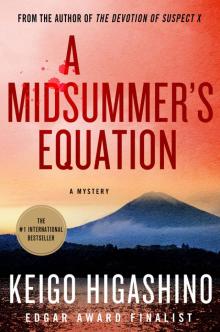 A Midsummer's Equation: A Detective Galileo Mystery
A Midsummer's Equation: A Detective Galileo Mystery The Devotion of Suspect X
The Devotion of Suspect X Journey Under the Midnight Sun
Journey Under the Midnight Sun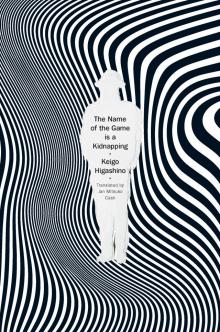 The Name of the Game Is a Kidnapping
The Name of the Game Is a Kidnapping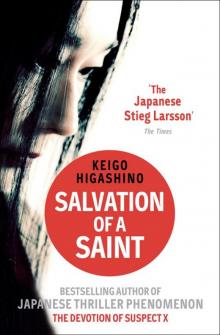 Salvation of a Saint
Salvation of a Saint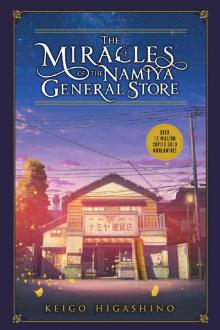 The Miracles of the Namiya General Store
The Miracles of the Namiya General Store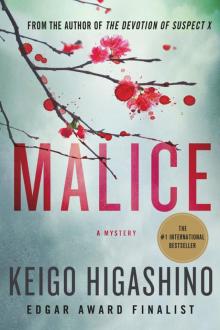 Malice: A Mystery
Malice: A Mystery